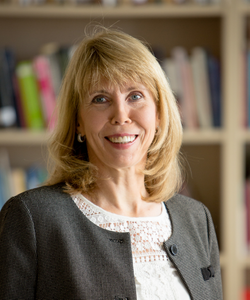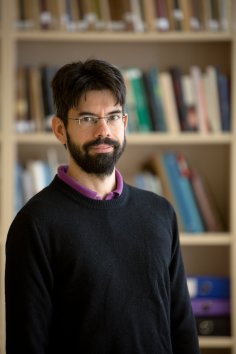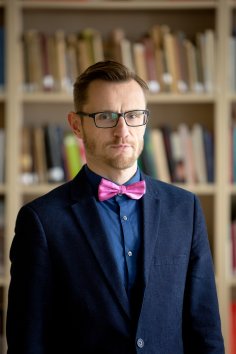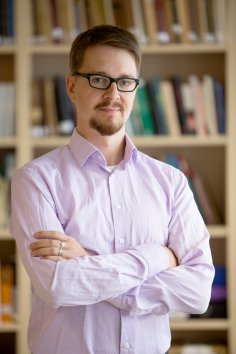Chair of Practical Philosophy
The Chair of Practical Philosophy teaches political and legal philosophy, ethics, philosophy of social science and philosophy of history from the 20th and 21st century in the analytic style as well as relevant material from Ancient Greek and early modern theories of morality and society.
|
Image

|
Kadri Simm Area of specialisation: Ethics, bioethics, political philosophy E-mail: kadri.simm@ut.ee |
My background is interdisciplinary - BA in History (1994-2000) from the University of Tartu, MA in Gender Studies (2000-2001) from the Central European University, and PhD in Philosophy (2001-2005) again from the University of Tartu. That's good, because life and its problems are also interdisciplinary! I have worked in the Tartu Department of Philosophy since 2001 but I routinely work with researchers from other disciplines and universities.
My main research and teaching interests (as well as publications) pertain broadly to moral and political philosophy. I am especially interested in problems of justice (global justice, distributive justice) and in all things bioethics (the ethics of new medical technologies (including reproductive technologies and enhancements), as well as more traditional topics like abortion and euthanasia). My years of teaching ethics have only increased my interest in ethics teaching methods as well as some of those not-so-obvious but nonetheless fundamental questions about what ethics teaching is supposed to achieve. Finally, I am also interested in research ethics and integrity issues (I am, for instance, the UT Faculty of Arts and Humanities' Research Integrity Counsellor).
I regularly teach "general" courses on political philosophy (intro), research ethics and moral philosophy. I also often teach more specialised courses: for example "Justice"," Equality", "Bioethics" etc. I supervise students of all levels (BA, MA, and PhD).
I try to do my share of writing in popular media (mostly this happens when I get very angry at something ;). Most recently I did an interview with Peter Singer at the annual Estonian philosophy conference (fall 2021) and that was published also in the Estonian cultural weekly Sirp ("Well-being is an objective value": https://sirp.ee/s1-artiklid/c9-sotsiaalia/heaolu-on-objektiivne-vaartus/).
The most recent projects I've been involved at the EU level are as follows:
"Responsible Open Science in Europe" focuses on the epistemic and ethical aspects of Open Science -the kind of science that relies mostly on open and shard data, open access publishing, novel peer reivew practices etc (https://rosie-project.eu/). Another ongoing project is "Ethically responsible Innovations in reproductive medicine" where together with medical geneticists we discuss the ethical issues related to human reproduction and modern medical technologies (https://cordis.europa.eu/project/id/952516).
* Simm, Kadri (2021). Benefit-sharing: from compensation to collaboration. In: Graeme Laurie, Edward Dove et al (Ed.). Cambridge Handbook of Health Research Regulation (148−157). Cambridge University Press. (Cambridge Law Handbooks). DOI: 10.1017/9781108620024.019.
* Simm, Kadri (2020). Ethical decision-making in humanitarian medicine: how best to prepare? Disaster Medicine and Public Health Preparedness, 1−5. DOI: 10.1017/dmp.2020.85.
* Simm, Kadri (2018). Can Theories of Global Justice Be Useful in Humanitarian Response? Cambridge Quarterly of Healthcare Ethics, 27, 2, 261−270. DOI: 10.1017/S0963180117000597.
* Sutrop, M; Simm, K (2020). Developing guidelines for the distribution of scarce medical resources during the COVID-19 pandemic. The Estonian case. Trames Journal of the Humanities and Social Sciences, 24 (2), 251−268. DOI: 10.3176/tr.2020.2.08.
The Nordic-Baltic Philosophy of Medicine and Healthcare network (http://www.mies.mf.vu.lt/en/nnpmme/), European Society for Philosophy of Medicine and Healthcare (https://www.espmh.org/).
|
Image

|
Margit Sutrop Area of specialisation: Ethics, bioethics E-mail: margit.sutrop@ut.ee |
I initially graduated from journalism in 1986 but have ever since then pursued philosophy. My PhD is from University of Konstanz (1997) in Germany. In 2000 I returned to Estonia and built up the interdisciplinary Centre for Ethics. I am now Professor of Practical Philosophy and head of the Centre for Ethics. From 2013-2019 I served as the dean of the Faculty of Arts and Humanities. I have been a member of the Estonian parliament since Spring 2021.
My main research interest are in ethics, especially value theory, value-reflection and values education. But I have also researched, published and supervised on the ethics of new technologies (AI), privacy issues and medical and research ethics. I lead the writing and stakeholder engagement process of the Estonian Code of Conduct for Research Integrity.
I teach classes on ethics, various applied ethics topics (pedagogical ethics, business ethics), and research integrity.
I regularly write articles for Estonian popular media outlets as well as giving interviews on radio and television. A selection of my publications is available from on my ETIS page (https://www.etis.ee/CV/Margit_Sutrop/est?tabId=CV_ENG).
Currently ongoing is the Horizon 2020 project "EMPOWERING AND EDUCATING YOUNG PEOPLE FOR THE INTERNET BY PLAYING (2020-23).
*Sutrop, M.; Lõuk, K. (2021). Ethical research in a global context: A dynamic tension between universal values, principles and contextual applications. In: Iphofen, R. and O’Mathúna, D (Ed.). Ethical Evidence and Policymaking: Interdisciplinary and International Research. Policy Press/Bristol
*Sutrop, M; Simm, K (2020). Developing guidelines for the distribution of scarce medical resources during the COVID-19 pandemic. The Estonian case. Trames Journal of the Humanities and Social Sciences, 24 (2), 251−268. DOI: 10.3176/tr.2020.2.08. University Press [forthcoming].
*Sutrop, M. (2020). Deep conceptual moral disagreements: Over what do we disagree and why? Trames Journal of the Humanities and Social Sciences, 24 (3), 295−314. DOI: 10.3176/tr.2020.3.03.
*Sutrop, M. (2020). Challenges of Aligning Artificial Intelligence with Human Values. Acta Baltica Historiae et Philosophiae Scientiarum, 8 (2), 54−72. DOI: 10.11590/abhps.2020.2.04.
I am a member of Academia Europea (https://www.ae-info.org/).
|
Image

|
Francesco Orsi Area of specialisation: Ethics, metaethics E-mail: francesco.orsi@ut.ee |
I am Associate Professor in Practical Philosophy at the Philosophy Department of the University of Tartu, Estonia. I have worked in Tartu since 2010. During these years I have led several projects funded by the Estonian Research Council researching various aspects of ethical thinking (2017-2020 "Practical Metaethics", 2013-2016 "The Unity of Normative Discourse", 2010-2013 "Understanding Normative Cognition"). Previously I had lectured at the university of Reading (2008-9). I received my PhD in Philosophy in December 2007 from Scuola Normale Superiore, Pisa, Italy. In 2007 I also received an MPhil from the University of Reading. I did my BA and MA in philosophy at Università La Sapienza in Rome.
My main philosophical interests lie in ethics, particularly in meta-ethics (roughly: are ethical judgments objective or subjective?), value theory (how to best understand notions like good, bad, and the like?), and the history of ethics. I am currently writing a history of the notion that we can only desire what seems good to us. I have published articles on the analysis of value and related concepts like reasons and fitting attitudes. I have a side-interest in the ethics and philosophy of sexuality. I am keen to supervise on any topic closely or remotely related to ethics. I have supervised BA and MA theses on diverse topics like the nature of value, the ethics of cybersex, happiness, autonomy, animal rights and more. Currently also supervising four PhD theses (on Kant's constitutivism, the morality of empathy, naturalism in ethics, property rights).
I have taught on general meta-ethics, moral realism, value theory, Mill's utilitarianism, Hume's ethics, moral particularism, the philosophy and ethics of sexuality, moral psychology.
For a recent example of my writing in a non-academic venue that is still of current interest, see https://blog.ut.ee/health-as-a-value-health-as-a-right/. In Estonian: https://novaator.err.ee/1081075/francesco-orsi-tervis-trumpas-kriisi-to…
I am writing a monograph on the history of the guise of the good to be published by Routledge. In 2021 my edited special issue on The Modern Guise of the Good came out in Philosophical Explorations (24,1). In 2015 my book Value Theory was published by Bloomsbury. Other recent work includes: (2021). Perverse Reasons. Philosophy, 1−24. DOI: 10.1017/S003181912100005X. (2021). Mill's proof and the guise of the good. Philosophical Explorations, 24 (1), 93-105. DOI: 10.1080/13869795.2020.1868117.(2021). (with Andrés G. Garcia) The explanatory objection to the fitting attitude analysis of value. Philosophical Studies, 178 (4), 1207–1221. https://rdcu.be/b4brDAnd here is a reply to our paper by Wlodek Rabinowicz and Toni Rønnow-Rasmussen: https://link.springer.com/article/10.1007/s11098-020-01558-0 (2020). Meta-ethical Disagreements. Trames Journal of the Humanities and Social Sciences, 24 (3), 423−439. DOI: 10.3176/tr.2020.3.09. Hume and the guise of the bad. Journal of Scottish Philosophy, 18 (1), 39−56, 2020. 10.3366/jsp.2020.0254 Seks, surm ja perverssus [Sex, Death and Perversion]. Akadeemia 7, 1301−1312, 2019.
Mill and Sexual Reform. Think 17 (50): 101-112, 2018.
Normative Judgment and Rational Requirements: A Reply to Ridge. Analytic Philosophy 59 (2):281-290, 2018.
Ethical Non-naturalism and the Guise of the Good, Topoi 37 (4): 581-590, 2018.
I have been principal investigator in several projects funded by the Estonian Research Council researching various aspects of ethical thinking (2017-2020 "Practical Metaethics", 2013-2016 "The Unity of Normative Discourse", 2010-2013 "Understanding Normative Cognition").
I used to coordinate the Baltic Philosophy Network, mostly dedicated to organizing intensive courses for MA level students.
|
Image

|
Siobhan Kattago Area of specialisation: Political philosophy, existentialism, ethics, ancient philosophy, philosophy of history E-mail: siobhan.kattago@ut.ee |
My background is in Philosophy and Sociology and I graduated from the Graduate Faculty at the New School for Social Research (1997). I have been a faculty member at the University of Tartu since 2015 and have taught at the University of Tallinn, New York University and the New School.
My research focuses on how the acceleration of time and catastrophic pasts caused by war, genocide and colonialism influence experiences of time at the individual and collective level. I am engaged in long-term research on Hannah Arendt and am interested in the intersection of planetary time with the ruptures of chronological time caused by historical events and their lingering aftermaths. I have supervised theses on memory, tradition and historical consciousness as well topics related to alienation, populism, statelessness, the politics of recognition and sovereignty.
I teach courses on memory, history and time, as well as the history of political thought, modernity, critical theory of the Frankfurt School, seminars on Hannah Arendt, sovereignty and power.
I have written blogs for Public Seminar (https://publicseminar.org/author/skattago/) and IAI News (https://iai.tv/articles/hannah-arendt-on-why-its-important-to-break-you…) on Arendt and worldlessness, statelessness, the politics of memory, fear and sovereignty.
I am a researcher with the Centre of Excellence in Estonian Studies TK 145 at the University of Tartu and was a researcher in the Study Circle: Narrative and Memory: Ethics, Aesthetics, Politics at the Nordic Summer University 2017-2019 as well as with the Estonian Research Council Grant IUT 20-5: Philosophical Analysis of Disagreements at University of Tartu, 2015-2019.
Participant in a COST project https://www.slowmemory.eu
I have published in Memory Studies, New German Critique, the European Legacy and the Journal of Poltical Power. My books include: Encountering the Past within the Present: Modern Experiences of Time (2019), The Ashgate Research Companion to Memory Studies (editor, 2015), Memory and Representation in Contemporary Europe: The Persistence of the Past (2012) and Ambiguous Memory: the Nazi Past and German National Identity (2001).
I am a board member of the European Observatory on Memories and the Memory Studies Association, member of the editorial board of Problemos and European Journal of Cultural and Political Sociology. I am management committee member for COST CA 20105 on Slow Memory: Transformative Practices for Times of Uneven and Accelerated Change (2021-2025) and partcipate in a working group on transformations of conflict.
|
Image

|
Marek Volt Area of specialisation: Aesthetics, philosophy of art E-mail: marek.volt@ut.ee |
Over the years, I have written quite a number of articles in newspapers and cultural magazines, mainly on art and sex. In 2004 I translated into Estonian, World Charter for Prostitutes' Rights (1985).
Volt, Marek (2022). Kuidas vormistada võitu? Liigse skoorimise probleem spordieetikas [The problem of excessive scoring in sport ethics]. – Akadeemia 1-6, 1−20 [forthcoming].
Volt, Marek (2022). Kunsti hindamise filosoofia [Philosophy of art evaluation]. EKSA [forthcoming].
Volt, Marek (2018). Phil Jackson: Ühe edurikka treeneri omakasupüüdmatu ja hooliv korvpallifilosoofia [Phil Jackson: Selfless and caring basketball philosophy of a successful coach]. – Akadeemia 12: 2228−2252.
Mölder, Bruno; Jakapi, Roomet; Volt, Marek (2018). Sissejuhatus filosoofiasse [Introduction to philosophy]. Tartu: Tartu Ülikooli Kirjastus.
Volt, Marek (2017). Kunst kui tundenakkus: Lev Tolstoi kunstidefinitsioon analüütilises perspektiivis [Art as emotional infectiousness: Lev Tolstoy’s definition of art in the analytical perspective]. – Methis Studia humaniora Estonica 19: 128−150. 10.7592/METHIS.V15I19.13440.
Volt, Marek; Reidolv, Kristiina (2017). Kunstiteose tõlgendamine ja hindamine: Filosoofiline suhteanalüüs [Interpretation
and Evaluation of a Work of Art: A Philosophical Analysis]. – Kunstiteaduslikke Uurimusi/ Studies on art and architecture 3-4 (26): 84−101.
Volt, Marek (2017). Esteetilise hoiaku ontoloogia [Ontology of the aesthetic attitude]. – Akadeemia 8: 1379−1401.
Volt, Marek (2016). Esteetilise suhtumise mõiste Nõukogude Eesti esteetikas [The concept of aesthetic attitude in the aesthetics of Soviet Estonia]. J. Sooväli, Ü. Matjus (Toim.). – Tagasi mõteldes: töid filosoofia ajaloost Eestis. Tartu: Tartu Ülikool, 314−329.
Volt, Marek (2015). Filosoofia ja analüüs, ent esteetika [Philosophy and analysis, but aesthetics]. – Studia Philosophica Estonica 8 (1): v−xxv.
Reidolv, Kristiina; Volt, Marek (2013). Definitsioon,interpretatsioon ja hindamine analüütilises kunstifilosoofias [Definition, interpretation and evaluation in
analytical philosophy of art]. – Studia litteraria estonica. Eesti teatriteaduse perspektiivid. A. Saro (Koost.); A. Saro, E.Süvalep, A. Merilai (Toim.). Tartu: Tartu Ülikooli Kirjastus, 152−180.
Volt, Marek (2011). Esteetilise suhtumise mõiste Nõukogude Eesti esteetikas [The Concept of Aesthetic Approach in Soviet
Estonian Aesthetics]. – Methis. Studia humaniora Estonica 7: 137−148.
Volt, Marek (2011). Kuidas õigustada esteetilist hoiakut? [How Can We Justify the Aesthetic Attitude?] – Kunstiteaduslikke Uurimusi/ Studies on art and
architecture 1-2 (20): 118−129.
Volt, Marek (2011). Tõde ja õhk: Sissejuhatus deflatsionismi tõeteooriasse [Truth and air: An introduction to the deflationsist theory of truth]. –Akadeemia 3: 437−452.
Volt, Marek (2009). Kuidas läbida ajaproovi? Arutlus temporaalsest aksioloogiast [How to Pass the Test of Time? Discussion of
Temporal Axiology]. – Kunstiteaduslikke Uurimusi/ Studies on art and architecture, 151−159.
Volt, Marek; Reidolv, Kristiina (2009). Arthur C. Danto. – XX sajandi mõttevoolud/kirjanduse uurimine. Annus, E. (Toim.). Tartu: Tartu
Ülikool, 519−535.
Volt, Marek (2007). Kas hea kunst peab meeldima? Arutlus deontilisest aksioloogiast [Must Good Art Be Liked? Discussion on Deontic Axiology]. – Kunstiteaduslikke Uurimusi/Studies on art and architecture 3: 85−99.
Volt, Marek (2007). "Kehaturg" Kunstihoones: Prostitutsioonivaidluse järelkahtlusi [„Sex Market” in Art Hall: Afterdoubts to
the Controversy of Prostitution]. – KUNST.EE 2: 32−34.
Volt, Marek. (2006). Vahetu kogemise roll kunstiteose hindamisel: ontoloogilised ja episteemilised eeldused [The Role of Immediate Experience in Evaluating Works of Art: Ontological and Epistemic Presumptions. – Kunstiteaduslikke Uurimusi/ Studies on art and architecture 1-2 (15): 47−58 .
Volt, Marek (2006). Kunsti hindamise ontoloogilsed ja episteemilised eeldused [Ontological and Epistemic Presumptions of Evaluation
of Art]. –Studia Philosophica 5: 53−71.
Volt, Marek (2006). Esteetikast [Of Aesthetics]. Tallinn: Sirp.
Volt, Marek (2004). Onko Virossa esteetiikka? Niin & näin: filosofinen aikakauslehti 42 (3): 49−55.
Volt, Marek (2002). Controversy about the Traditional Theory in Aesthetics. – Journal of Comparative Literature and Aesthetics 15: 123−133.
Volt, Marek (2002). Doing Justice to Traditional Aesthetic Theories: Weitz Reconsidered. – Trames: Journal of the Humanities and Social Sciences 3: 266−279.
|
Image

|
Mats Volberg Area of Specialisation: Political Philosophy, Ethics, Philosophy of Education E-mail: mats.volberg@ut.ee |
I have worked at the Department as a Research Fellow since 2015. I hold a PhD in Philosophy from the University of York (thesis title "The Foundation and Nature of Contemporary Liberalism", 2015), prior to that I obtained my BA and MA in philsophy from Univeristy of Tartu on 2008 and 2010 respectively. In addition to my training in Philosophy I have also studied law. I received my BA from the University of Tartu in law in 2020 and I am on track to graduate with MA in law from the University of Tartu in 2022. In addition to my job at the Tartu Philosophy Department, I also currently work as a lawyer at the Law Firm LEXTAL.
I have supervised theses in two main areas: political philosophy, broadly construed (social justice, freedom of speech, nudge theory, place of religion in liberal democracies); andmoral issues related to artificial intelligence. These reflect my main research interests. I'm currently on the lookout for a student who wants to write their thesis on epistocracy and ethical issues related to voting.
In recent years I've mostly focused on teaching argumentation and critical thinking: every year I teach a full introductory course for humanities BA students on theis subject, with an emphasis on practical applicability - how to recognize and evaluate arguments in op-eds. Every semester I also teach philosophical argumentation to PhD students from all fields as a part of the university-wide Philosophical Disagreements course.
For a while now, I've been quite active in public realm (outside the academic "ivory tower"). I have a long list of op-eds covering mostly political and legal issues: such as philosophical analyses of election slogans, the use of philosophy in Supreme Court decisions, the use of AI in administrative (court) procedures, and hate speech. In the last 5-6 years I have moderated or participated in over 10 public panel discussions related to ethical issues concerning AI, most notably at the Responsible AI Forum 2021, Digital Agenda for Estonia 2021+, and the annual Estonia "Opinion Festival". About 8-10 times a year I visit a high school to deliver a special lecture to them either introducing philosophy in general or on some more specific issue. I edit a booklet for high schoolers titled "An Invitation to Philosophy", the 4th edition of which came out in January 2021.
Centre of Excellence in Estonian Studies (CEES) project (SHVHV16145T, 2016-2023, PI Mare Kõiva). The Centre brings together 15 research groups with more than 60 researchers in addition to more than 50 post-graduate students from the Estonian Literary Museum, the University of Tartu (from the sphere of the humanities and arts as well as from the natural and exact sciences), the Institute of the Estonian Language, Tallinn University, the Estonian Academy of Music and Theatre, and the Institute of Cybernetics at the Tallinn University of Technology. The Centre studies the linguistic and cultural dimensions of Estonia and Estonian identity, both from a historical and contemporary perspective.
Luik, Olavi-Jüri; Volberg, Mats (2021). Philosophical battle against moral hazard: do we need law methodology change from “all or nothing principle” to “principle of proportionality”? Methodological problems of the civil law researches.
Volberg, Mats (2019). Sandel, Michael. In: Sellers M., Kirste S. (Ed.). Encyclopedia of the Philosophy of Law and Social Philosophy (1−6). Dordrecht: Springer. DOI: 10.1007/978-94-007-6730-0_301-1.
Volberg, Mats (2015). Perfectionist Liberalisms and the Challenge of Pluralism. Studia Philosophica Estonica, 8.1, 113−127.
Volberg, Mats (2013). Persons as Free and Equal: Examining the Fundamental Assumption of Contemporary Liberal Political Philosophy. Diacritica, 27.2, 15−39.
- Emmi Jennina Kaaya, Junior Research Fellow in Philosophy
- Andrei Gavrilin, Junior Research Fellow in Philosophy
- Sergei Sazonov, Junior Research Fellow in Philosophy
- Jay Allen Zameska, Junior Research Fellow in Philosophy
